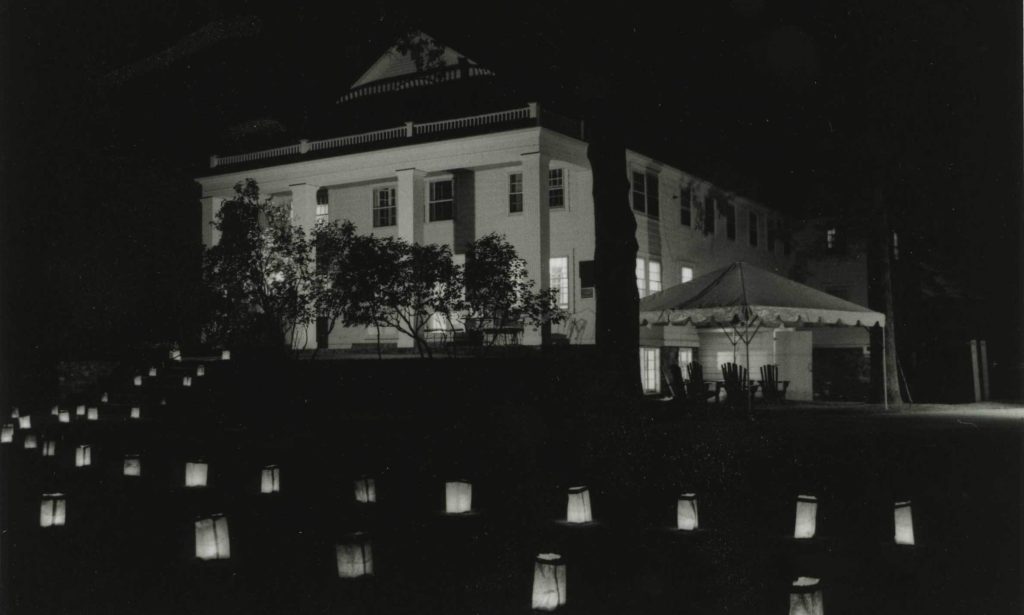Why MacDowell Now?
In January of 2020 we introduced a new series of essays written by our Fellows, intended to interrogate the transcendent relevancy of the American artist residency at this particular moment in time. We dubbed these “Why MacDowell NOW?” In the first, board chairman, author, and visual artist Nell Painter rendered an exquisite essay about her second residency at MacDowell that contemplated – under the gaze of Beauford Delaney’s spectacular James Baldwin portrait in our library – just what role the artist might play in a less-than-stable world. Specifically, Ms. Painter resonated with Baldwin’s awareness that, while in Istanbul, he felt “the freedom to stop, and do nothing in order to start a project anew.” For Nell, that observation paralleled the rare opportunity of a MacDowell Fellowship. A chance to re-open. To renew.
We continued asking Fellows to reflect on the question at the top of this page throughout the COVID-19-prompted closure of our Peterborough campus. We asked them to consider what this moment holds for artists, and the resulting essays are testaments to their spirit while reflecting on past experience as well as looking to the future. We hope you enjoy these words.
Adapted from Executive Director Philip Himberg’s letter “In COVID Times.”

MacDowell exists for creative art makers who will continue to illuminate the path forward. (Photo by Joanna Eldredge Morrissey)
DeSantis’ Dearth of Understanding of America’s Past Fails Everyone in the Present
Author and visual artist Nell Painter laments the Florida governor's attempts to push Black Americans out of the American consciousness.
Read Nell's essayArtist Residencies are Essential to a Burning World
Journalist Cameron McWhirter makes the case that an artist residency is a critical recharging station, a place where artists can figure out how to run toward a troubled world.
Read Cameron's essaySwimming in It: Art And (Im)Morality
Playwright Jen Silverman argues that arts institutions should ignore moral judgments and base their support of artists on the questions being asked by the art rather than on whether it aims to sell the right answers.
Read Jen's essayThe Eternal Importance of the Artist’s Mystery
Writer Casey Plett makes the case that artist residencies should avoid pressuring artists to anticipate the outcome of their creative works.
Read Casey's EssayInvisible No More!
Photographer Tonita Cervantes writes about the role and obligation of artist residency programs like MacDowell to lift up Indigenous voices and topple the walls of conventional art forms.
Read Tonita's essayFreedom to Connect
Through an examination of freedom, the urbanist, filmmaker, and writer Cassim Shepard finds a new understanding of community.
Read Cassim's essayNew Americana
Filmmaker Isabel Sandoval writes that America must throw open the gates of cultural production to minority artists so that the country can “start thinking the way minorities think, and see the world from our eyes” to overcome its “deep-seated prejudice.”
Read Isabel's essayReflections on Shitty Performance Art, Crisis, and Isolating Ourselves Intentionally After Isolating Unintentionally
Performance artist, comedian, and MacDowell Fellow Kristina Wong (10) challenges perceptions of art, politics, satire, and especially art residencies in a society altered by a pandemic.
Read Kristina's essayIn Pursuit of Tenderness for All Living Things
Poet and MacDowell Fellow Aimee Nezhukumatathil (06, 09, 19) has penned a poignant account about writing—and publishing—a book about the joy and wonderment of the outdoors, and doing so as an Asian American person.
Read Aimee's essayDo Not Disappear the Words
Mashuq Mushtaq Deen reflects on both words’ power to do harm and the harm we can do ourselves through their banishment from our language.
Read Deen's EssayThe Monster of Monday Music
Visual artist Riva Lehrer's adventure to write a memoir became a quest to give voice to those who are not prioritized.
Read Riva's EssayAyad Akhtar on Art and the Art Residency in a Troubled Democracy
Executive Director Philip Himberg spoke to Pulitzer Prize-winning playwright, novelist, and screenwriter Ayad Akhtar about the role of artist residencies, and the change that the art and artists they support can bring about..
Read their Q&AWithout Artists There is No Justice
Nearing the eve of a democracy's precious transfer of power, and in the wake of shocking violence in our country's capital, I have been thinking a great deal about how the mission of MacDowell and other artist residencies impacts our daily lives, and what responsibilities we assume when new political leadership is forged, and hopeful visions are launched and set to sail.
Read Philip Himberg's essayLet the Circle Be Unbroken
Last August, while moving my many boxes of archives to the barn to await their transport to the Beinecke Library at Yale, I came across a collection of poems I’d written during my first residency at MacDowell....
Read Jacqueline Woodson's essy"Covid Journals" a Testament to Seeing Acutely
In March of this year I was sitting in my studio in New York under lockdown, wondering what I was supposed to be doing as an artist....
Read Accra Shepp's essayOn Lockdown, Wood Pigeons, and Grounding Ourselves in the Natural Rhythms of Creativity
When Scotland went into COVID-19 lockdown on March 23, 2020 – a date now permanently emblazoned in my mind – I found it very hard to do any of my work as a composer, researcher, or writer....
Read Emily Doolittle's essayIt Has Space to Forge a New National Vision
Today is June 10, 2020 – a day on which it is particularly impossible to disregard the exact moment at which I am writing....
Read Susan Choi's essayWhitman, Melville, the Virus
Decades ago, someone said in a literature seminar I attended that while America’s founders built the edifice of American democracy it was Walt Whitman who gave America its inner meaning and created the American social bond....
Read Vijay Seshadri's essayAt MacDowell with James Baldwin, to Stop and Do Nothing In Order to Start Anew
I drove up to MacDowell from New Jersey in early November 2019 with only a beginning of an idea of what I wanted to do....
Read Nell Painter's essay